Season II, Episode 5: The Orenburg Regional Court
The next day DW and I got up and ate a breakfast of the bread, yogurt, kefir, fruit, and nuts I had bought the day before at the store down the block from our hotel. It was a little convenience store that offered most of the staples of life, including a manifold selection of beer, wine, and spirits. Often you can find a store like this by looking for a sign that says Продукты (pronounced “productwee”) or Магазин (pronounced “mahgahzeene”).
Natalia was coming to pick us up at 11:00 AM to purchase an in-kind donation for the baby home. On our behalf, Natalia asked what they wanted and the director asked for new wall paper to decorate the music room. Our court hearing was scheduled for 2:00 PM. We had a lot to do between 11:00 AM and 2:00 PM - go to the baby home, see Candidate #3 again, pick-up a member of the baby home staff to select the wallpaper, go to the home decorating store ad buy wall paper, and meet with Natalia and Olga to prepare for the hearing. We did not know if three hours would leave us enough time to change into our court clothes, so we dressed for court before Natalia picked us up.
First we went to the baby home to pick-up one of the caregivers to accompany us to the store and select the wallpaper. Then we went to a home improvement and decorating store about five minutes away. We all went in and the lady from the baby home started looking around at samples of wall paper. There were rows and rows of it. The lady from the baby home, Natalia, Olga, and DW all walked up and down the rows looking at different wall paper samples. I snuck off into the small tool section.
Coming out of the tool section I saw some really appealing children’s wallpaper. Some with stars, some with animals, some illustrated with children and buildings with onion dome roofs. I called the ladies over and suggested some of the children’s wall paper. DW liked several of the children’s wall paper too. However, our companion from the baby home seemed captivated by the exciting rolls of textured Navajo white not much different than the music room’s current wall paper. She said they could not put the illustrated children’s wallpaper in the music room because it would clash with their Christmas time decorations. Hey, it’s their music room, so DW and I sad “pick whatever you like.” She did.
Natalia then became very concerned about the cost of the wallpaper the baby home representative had selected. It was more than she expected we would spend. “I’m concerned too” I replied. “But, the staff at the baby home has raised my son for the first year of his life. That’s worth a lot more than another 2,000 Rubles isn’t it?” She looked me dead in the eye like my mother does when I’ve done something that profoundly pleases her, smiled, and squeezed my arm. No words were necessary. We picked-up a couple of boxes of wall paper adhesive, paid for our goods, and loaded them in Alexander’s car.
We drove back to the baby home and before I knew it, the rolls of wallpaper were out of the car and standing in the music room. Members of the staff, including the director, came to see them. Ironically, it had the atmosphere of friends and relatives coming to see a new baby. I was overwhelmed by the enthusiasm. It was great to see that DW and I could deliver some extra joy to the baby home and the ladies so dedicated to its inhabitants.
Soon they brought in Candidate #3. We spent about 10-15 minutes with him. Then we left for Orenburg center to prepare for the hearing and then go to court.
To prepare for the hearing, we went with Natalia and Olga to the same to the coffee café where we went for crepes and coffee with Sergei on our first trip in March. We stayed for about half-an-hour discussing the kinds of questions Natalia and Olga expected the judge to ask us. Because our judge had just recently started hearing adoption cases - Natalia and Olga told DW and me that this was his second or third adoption case – they did not have a lot of data to base their briefing on. Among others, they told us to be ready to answer the following questions:
Natalia was coming to pick us up at 11:00 AM to purchase an in-kind donation for the baby home. On our behalf, Natalia asked what they wanted and the director asked for new wall paper to decorate the music room. Our court hearing was scheduled for 2:00 PM. We had a lot to do between 11:00 AM and 2:00 PM - go to the baby home, see Candidate #3 again, pick-up a member of the baby home staff to select the wallpaper, go to the home decorating store ad buy wall paper, and meet with Natalia and Olga to prepare for the hearing. We did not know if three hours would leave us enough time to change into our court clothes, so we dressed for court before Natalia picked us up.
First we went to the baby home to pick-up one of the caregivers to accompany us to the store and select the wallpaper. Then we went to a home improvement and decorating store about five minutes away. We all went in and the lady from the baby home started looking around at samples of wall paper. There were rows and rows of it. The lady from the baby home, Natalia, Olga, and DW all walked up and down the rows looking at different wall paper samples. I snuck off into the small tool section.
Coming out of the tool section I saw some really appealing children’s wallpaper. Some with stars, some with animals, some illustrated with children and buildings with onion dome roofs. I called the ladies over and suggested some of the children’s wall paper. DW liked several of the children’s wall paper too. However, our companion from the baby home seemed captivated by the exciting rolls of textured Navajo white not much different than the music room’s current wall paper. She said they could not put the illustrated children’s wallpaper in the music room because it would clash with their Christmas time decorations. Hey, it’s their music room, so DW and I sad “pick whatever you like.” She did.
Natalia then became very concerned about the cost of the wallpaper the baby home representative had selected. It was more than she expected we would spend. “I’m concerned too” I replied. “But, the staff at the baby home has raised my son for the first year of his life. That’s worth a lot more than another 2,000 Rubles isn’t it?” She looked me dead in the eye like my mother does when I’ve done something that profoundly pleases her, smiled, and squeezed my arm. No words were necessary. We picked-up a couple of boxes of wall paper adhesive, paid for our goods, and loaded them in Alexander’s car.
We drove back to the baby home and before I knew it, the rolls of wallpaper were out of the car and standing in the music room. Members of the staff, including the director, came to see them. Ironically, it had the atmosphere of friends and relatives coming to see a new baby. I was overwhelmed by the enthusiasm. It was great to see that DW and I could deliver some extra joy to the baby home and the ladies so dedicated to its inhabitants.
Soon they brought in Candidate #3. We spent about 10-15 minutes with him. Then we left for Orenburg center to prepare for the hearing and then go to court.
To prepare for the hearing, we went with Natalia and Olga to the same to the coffee café where we went for crepes and coffee with Sergei on our first trip in March. We stayed for about half-an-hour discussing the kinds of questions Natalia and Olga expected the judge to ask us. Because our judge had just recently started hearing adoption cases - Natalia and Olga told DW and me that this was his second or third adoption case – they did not have a lot of data to base their briefing on. Among others, they told us to be ready to answer the following questions:
Why do you want to adopt?
Why did you choose to adopt from Russia?
Have you seen the child?
Are you aware of the child’s medical condition and do you still want to adopt him knowing his condition?
How will you discipline the child? Will you use corporal punishment?
Do you have health insurance? Will your adopted child be covered by your health insurance?
What is your feeling about the Pavlis case?
FYI, the Russian Adoption Handbook by John H. Maclean has an excellent list of questions that PAPs should be prepared to answer.
The briefing finished I paid the check [счет] and headed to the men’s room to put on my tie. Then we left the café and walked about 3 blocks to the Orenburg Regional Courthouse.
Outside the courthouse we met our interpreter, Vyacheslav [Вячеслав], or Vlad for short. We entered through the main entrance, passed through a security check-point that barely was, headed through a labyrinth of dark corridors and up a couple flights of stairs to room #42.
Sitting outside the courtroom were two ladies I did not recognize. The first looked to be in her mid to late forties with short hair dyed a reddish-brown color, about 5’4 to 5’6”, and about 170-190 lbs. She was dressed in a blue-grey garment that looked like a cross between a dress and a long lab-coat. The second lady looked to be in her early to mid thirties, brown hair extending beyond her shoulders, large and imposing brown eyes, 5’5” to 5’7”, and about 120-135 lbs.
We all stood in the hallway outside room #42 for about five minutes. Then the judge appeared, walked into the courtroom, and all except Natalia and Olga followed. The judge was a gentleman in his early to mid forties with brown eyes. He was approximately 5’7” to 5’9” with dark hair in an elaborate “comb-over”. His demeanor was serious, but his face was very round and radiated kindness. He wore a black robe like a judge in an American judge.
The judge took the bench, opened the hearing and introduced everyone in the courtroom. There was a young gentleman serving as a clerk whom the judge identified as the court secretary. The first lady with the short reddish-brown hair was the social worker assigned to our case. The second lady with the long brown hair was the state’s attorney (prosecutor). The judge explained the nature of the hearing and then began reading from our adoption petition and our dossier. He read aloud from DW’s and my places and dates of birth to our petition to adopt Candidate #3 and just about everything in between.
When he finished he asked if either DW would like to say anything. I though that we had to so I got up and started to speak. After the judge had already said so much, and with no question from him to respond to, I was, however, at a loss for something to say. I was shuffling through my brain. What would be appropriate? Green is my favorite color, I played outside linebacker on the J.V. football team, I prefer an electric shaver to a blade, my first cat’s name was Frosty….. Quickly, I just stared to tell our story beginning from our decision to adopt, disregarding the fact that I was mostly repeating what the judge had just said.
After a minute that seemed like an hour, the judge started breaking in with questions. Ohhh, was I relieved. And it was mostly questions that we expected. Some examples followed by some of my private thoughts I kept to myself:
“What is your job?”
“I’m a lawyer.” That was like on page two of the dossier you just spent 15 minutes reading to us.
“How much does your job pay you? Are you financially able to raise a child?”
“My job pays me $*** per year. I think that will be enough.” Did you skip the tax returns and employment verification letters I had to make copies of and for the latter, get acknowledged by a notary and apostilled by the Illinois Secretary of State?
“Do you own or rent your home?”
“We own our home.” That’s in that “yaro deed”, among other places, in our dossier tooooo.
“What is your neighborhood like?
“Residential, with houses and schools nearby.” What part of the photos in the dossier I see on your bench did you not look at?
“What do you think of this child?”
“I just adore him.”
“Have you been told of the child’s medical condition?”
“Yes.” No, I was sending all those e-mails, and making all those phone calls, to Dana Johnson to set up a poker game for when we returned to the states.
“Why did you decide to adopt?”
“It is physiologically impossible for us to have biological children.”
“Why did you decide to adopt from Russia?”
“Because my family that has come before me came from Russia and I would like my family that goes after me to come from Russia too.”
Then the judge turned questioning over to the state’s attorney. I continued to stand. She remained seated looking up at me as if her eyes were boring through my face and I gazed straight back into them as I listened and responded to her questions. Some examples followed by some more thoughts I just kept to myself:
“In the part of your medical report about mental illness and physiciatric care, the doctor wrote ‘norm.’ What does this mean? Does it mean there is something wrong? Or does it mean there is no problem?”
“Все нормально.” (Literally “everything normal”, a common Russian way of saying “everything is OK”).
“You owe money on your house correct?”
“Yes.” In the dossier.
“How much?”
“$*** dollars.” Ditto.
“How long will you owe money on your house?”
“** years.”
“What do you think of the woman from near where you live who killed the boy she adopted in Russia?”
“First, I think it’s a tragedy for everyone, most of all the little boy. I would have like to see her get a stiffer sentence than she got; however, that is what she what the court sentenced her to. As both a citizen, and especially as a lawyer, I must respect the decision of the court that heard her case even if I disagree with it.”
“At what age can young people buy alcoholic beverages in the United States?”
“They must be at least 21 years old.”
“Does that apply to buying beer too?”
“Yes, they must be at least 21 to buy beer.”
“What will you do if when the child is 15 he begins to drink a lot and has trouble with alcohol?”
“My wife and I will start by setting a good example for him. Neither of us drinks alcohol very often, and when we do, it’s in very modest amounts. If he begins to have trouble with alcohol, we’ll seek professional help and start him into treatment programs, like Alcoholics Anonymous.”
The judge broke in here and said that he though a good example was the most important thing for influencing children in approaching alcohol, as well as all other things.
All-in-all, the judge and state’s attorney each questioned me twice. Pretty comprehensively in the first round, just a few follow-up questions in the second. When they were finished with me, the judge asked DW to stand-up and they questioned her. Some examples:
“Will the child go to day care?”
“No. I will stay at home to care for him myself.”
“How will pay if the child needs medical care?”
“We have health insurance and once the court grants our petition to adopt him, he will be covered under our policy.”
Then the judge called the social worker who spoke about the background of Candidate #3 – his birth parents, his birth-mother mother’s pregnancy, his delivery, his hospitalization, his arrival at stay at the baby home, his entry onto the regional and federal databanks of children without parental care, and much more.
After the social worker finished, the judge asked DW and I whether we had anything more to add. We each said no. He then told the state’s attorney she could make her recommendation to the court. I was relived when the state’s attorney recommended that the court grant our adoption petition and immediately enforce its judgment (i.e., waive the ten day appeal period). I had an inkling things were going well at one point in the question and answer colloquy between the judge and DW when he started giving child rearing advice. Towards the very end, the judge went through every document in our dossier and read the name out loud. It was kind of like him going through a check-list. It probably added an extra ten to 15 minutes to the hearing. I’m guessing that with adoption cases still novel to him, and foreign adoption more polarizing an issue that ever in Russia, he was taking it slow to ensure he had everything just correct.
The judge retired to his chambers to deliberate. Then he returned with more questions and the state’s attorney asked some more questions too; perhaps two questions each. I’m sorry, but I just can’t recall what they were.
While the judge retired to deliberate again, the rest of us stood in the court room. Natalia and Olga joined us. We made small “unofficial small-talk” with the social worker and the state’s attorney. They were both very interested in (1) where I learned to speak Russian (more on learning to speak Russian here: http://forums.adoption.com/showthread.php?p=719510&highlight=pimsleur#post719510) and (2) my Russian ancestors (e.g., where in Russia they came from, when the emigrated). The state’s attorney was also interested in how much a state’s attorney was paid in the US and how it compared with my pay as a transactional lawyer at a private at firm.
At one point, the state’s attorney asked a question, in Russian, and Natalia turned and asked me to leave the room. All the ladies were sort of giggling so I had some idea of what the question was about. I cheerfully complied with their request and went into the hall way with Vlad. Earlier that morning Natalia had asked DW who “the boss” at Дом Nungesser is. DW told explained to Natalia that she was, but she let me think that I was. Natalia must have thought she said so in jest or that this was some sort of deception I’d yet to catch-on to. The state’s attorney had asked the same question and that’s when Natalia asked me to step out. Though I could not hear DW’s answer from the hallway, I could hear a roar of laughter.
The judge returned. Because we were already standing, we did not need to rise. The judge started reading his decision off of a piece of paper, probably the order that he had just signed in his chambers. He announced that he had granted our petition to adopt Candidate #3 and ordered immediate enforcement of his judgment (i.e., waived the ten day appeal period). Candidate #3 would now be known as Ashton Beauregard. I was pleased, but because it had not really sunk-in yet, I have to say I was not yet excited or sentimental. It was official, but it was not yet reality. All-in our hearing took approximately 2 hours.
Some have suggested that returning a child to the US for medical examination and treatment is often the most persuasive a thing a AP can present to the judge for waiving the ten day appeal period. In these times of controversy surrounding foreign adoption in Russia, I wagered that our judge would probably like something is the record backing up the need for medical care and a decision to waive the appeal period.
Accordingly, before leaving for Orenburg we scheduled an appointment for Ashton Beau with his pediatrician two days after our scheduled return to the US and had her sign an affidavit I prepared. The affidavit said that it was important for Ashton Beau to return for his appointment so she could examine and treat him and requested that the judge waive the appeal period so Ashton Beau could get home and attend his appointment.
I had the affidavit apostilled and gave it to Natalia on our first morning in Orenburg. I don't know if Natalia ever submitted the affidavit to the court, or even had it translated. However, I'm sure it could not have hurt for her to have it if only in reserve. If you think a such an affidavit might help you, please PM me with your e-mail address and I'll send it to you. No warranties on whether it will help, but it's something you can have in your back pocket and give to your agency and ask them if it would be wise to use.
The judge closed the hearing, everyone gathered around DW and me and congratulated us. We moved out into the hallway and I sent an e-mail on my Blackberry to our agency to tell them the results of the hearing. We had brought a gift for the judge and earlier that day discussed with Natalia whether it would be appropriate to give it to him. She suggested bringing the gift to court and deciding after the hearing based on how thing went. In the hallway we asked Natalia if it would be appropriate to give our gift to the judge. She said that under the circumstances, she thought yes. DW handed a Waterman fountain pen to Olga who left us momentarily to deliver it to the judge in his chambers. Then we went back down the stairs and dark corridors, past the security check point and out of the building. Our business at the Orenburg Regional Courthouse was finished.
The convenience store down the block from our hotel.
The briefing finished I paid the check [счет] and headed to the men’s room to put on my tie. Then we left the café and walked about 3 blocks to the Orenburg Regional Courthouse.
Outside the courthouse we met our interpreter, Vyacheslav [Вячеслав], or Vlad for short. We entered through the main entrance, passed through a security check-point that barely was, headed through a labyrinth of dark corridors and up a couple flights of stairs to room #42.
Sitting outside the courtroom were two ladies I did not recognize. The first looked to be in her mid to late forties with short hair dyed a reddish-brown color, about 5’4 to 5’6”, and about 170-190 lbs. She was dressed in a blue-grey garment that looked like a cross between a dress and a long lab-coat. The second lady looked to be in her early to mid thirties, brown hair extending beyond her shoulders, large and imposing brown eyes, 5’5” to 5’7”, and about 120-135 lbs.
We all stood in the hallway outside room #42 for about five minutes. Then the judge appeared, walked into the courtroom, and all except Natalia and Olga followed. The judge was a gentleman in his early to mid forties with brown eyes. He was approximately 5’7” to 5’9” with dark hair in an elaborate “comb-over”. His demeanor was serious, but his face was very round and radiated kindness. He wore a black robe like a judge in an American judge.
The judge took the bench, opened the hearing and introduced everyone in the courtroom. There was a young gentleman serving as a clerk whom the judge identified as the court secretary. The first lady with the short reddish-brown hair was the social worker assigned to our case. The second lady with the long brown hair was the state’s attorney (prosecutor). The judge explained the nature of the hearing and then began reading from our adoption petition and our dossier. He read aloud from DW’s and my places and dates of birth to our petition to adopt Candidate #3 and just about everything in between.
When he finished he asked if either DW would like to say anything. I though that we had to so I got up and started to speak. After the judge had already said so much, and with no question from him to respond to, I was, however, at a loss for something to say. I was shuffling through my brain. What would be appropriate? Green is my favorite color, I played outside linebacker on the J.V. football team, I prefer an electric shaver to a blade, my first cat’s name was Frosty….. Quickly, I just stared to tell our story beginning from our decision to adopt, disregarding the fact that I was mostly repeating what the judge had just said.
After a minute that seemed like an hour, the judge started breaking in with questions. Ohhh, was I relieved. And it was mostly questions that we expected. Some examples followed by some of my private thoughts I kept to myself:
“What is your job?”
“I’m a lawyer.” That was like on page two of the dossier you just spent 15 minutes reading to us.
“How much does your job pay you? Are you financially able to raise a child?”
“My job pays me $*** per year. I think that will be enough.” Did you skip the tax returns and employment verification letters I had to make copies of and for the latter, get acknowledged by a notary and apostilled by the Illinois Secretary of State?
“Do you own or rent your home?”
“We own our home.” That’s in that “yaro deed”, among other places, in our dossier tooooo.
“What is your neighborhood like?
“Residential, with houses and schools nearby.” What part of the photos in the dossier I see on your bench did you not look at?
“What do you think of this child?”
“I just adore him.”
“Have you been told of the child’s medical condition?”
“Yes.” No, I was sending all those e-mails, and making all those phone calls, to Dana Johnson to set up a poker game for when we returned to the states.
“Why did you decide to adopt?”
“It is physiologically impossible for us to have biological children.”
“Why did you decide to adopt from Russia?”
“Because my family that has come before me came from Russia and I would like my family that goes after me to come from Russia too.”
Then the judge turned questioning over to the state’s attorney. I continued to stand. She remained seated looking up at me as if her eyes were boring through my face and I gazed straight back into them as I listened and responded to her questions. Some examples followed by some more thoughts I just kept to myself:
“In the part of your medical report about mental illness and physiciatric care, the doctor wrote ‘norm.’ What does this mean? Does it mean there is something wrong? Or does it mean there is no problem?”
“Все нормально.” (Literally “everything normal”, a common Russian way of saying “everything is OK”).
“You owe money on your house correct?”
“Yes.” In the dossier.
“How much?”
“$*** dollars.” Ditto.
“How long will you owe money on your house?”
“** years.”
“What do you think of the woman from near where you live who killed the boy she adopted in Russia?”
“First, I think it’s a tragedy for everyone, most of all the little boy. I would have like to see her get a stiffer sentence than she got; however, that is what she what the court sentenced her to. As both a citizen, and especially as a lawyer, I must respect the decision of the court that heard her case even if I disagree with it.”
“At what age can young people buy alcoholic beverages in the United States?”
“They must be at least 21 years old.”
“Does that apply to buying beer too?”
“Yes, they must be at least 21 to buy beer.”
“What will you do if when the child is 15 he begins to drink a lot and has trouble with alcohol?”
“My wife and I will start by setting a good example for him. Neither of us drinks alcohol very often, and when we do, it’s in very modest amounts. If he begins to have trouble with alcohol, we’ll seek professional help and start him into treatment programs, like Alcoholics Anonymous.”
The judge broke in here and said that he though a good example was the most important thing for influencing children in approaching alcohol, as well as all other things.
All-in-all, the judge and state’s attorney each questioned me twice. Pretty comprehensively in the first round, just a few follow-up questions in the second. When they were finished with me, the judge asked DW to stand-up and they questioned her. Some examples:
“Will the child go to day care?”
“No. I will stay at home to care for him myself.”
“How will pay if the child needs medical care?”
“We have health insurance and once the court grants our petition to adopt him, he will be covered under our policy.”
Then the judge called the social worker who spoke about the background of Candidate #3 – his birth parents, his birth-mother mother’s pregnancy, his delivery, his hospitalization, his arrival at stay at the baby home, his entry onto the regional and federal databanks of children without parental care, and much more.
After the social worker finished, the judge asked DW and I whether we had anything more to add. We each said no. He then told the state’s attorney she could make her recommendation to the court. I was relived when the state’s attorney recommended that the court grant our adoption petition and immediately enforce its judgment (i.e., waive the ten day appeal period). I had an inkling things were going well at one point in the question and answer colloquy between the judge and DW when he started giving child rearing advice. Towards the very end, the judge went through every document in our dossier and read the name out loud. It was kind of like him going through a check-list. It probably added an extra ten to 15 minutes to the hearing. I’m guessing that with adoption cases still novel to him, and foreign adoption more polarizing an issue that ever in Russia, he was taking it slow to ensure he had everything just correct.
The judge retired to his chambers to deliberate. Then he returned with more questions and the state’s attorney asked some more questions too; perhaps two questions each. I’m sorry, but I just can’t recall what they were.
While the judge retired to deliberate again, the rest of us stood in the court room. Natalia and Olga joined us. We made small “unofficial small-talk” with the social worker and the state’s attorney. They were both very interested in (1) where I learned to speak Russian (more on learning to speak Russian here: http://forums.adoption.com/showthread.php?p=719510&highlight=pimsleur#post719510) and (2) my Russian ancestors (e.g., where in Russia they came from, when the emigrated). The state’s attorney was also interested in how much a state’s attorney was paid in the US and how it compared with my pay as a transactional lawyer at a private at firm.
At one point, the state’s attorney asked a question, in Russian, and Natalia turned and asked me to leave the room. All the ladies were sort of giggling so I had some idea of what the question was about. I cheerfully complied with their request and went into the hall way with Vlad. Earlier that morning Natalia had asked DW who “the boss” at Дом Nungesser is. DW told explained to Natalia that she was, but she let me think that I was. Natalia must have thought she said so in jest or that this was some sort of deception I’d yet to catch-on to. The state’s attorney had asked the same question and that’s when Natalia asked me to step out. Though I could not hear DW’s answer from the hallway, I could hear a roar of laughter.
The judge returned. Because we were already standing, we did not need to rise. The judge started reading his decision off of a piece of paper, probably the order that he had just signed in his chambers. He announced that he had granted our petition to adopt Candidate #3 and ordered immediate enforcement of his judgment (i.e., waived the ten day appeal period). Candidate #3 would now be known as Ashton Beauregard. I was pleased, but because it had not really sunk-in yet, I have to say I was not yet excited or sentimental. It was official, but it was not yet reality. All-in our hearing took approximately 2 hours.
Some have suggested that returning a child to the US for medical examination and treatment is often the most persuasive a thing a AP can present to the judge for waiving the ten day appeal period. In these times of controversy surrounding foreign adoption in Russia, I wagered that our judge would probably like something is the record backing up the need for medical care and a decision to waive the appeal period.
Accordingly, before leaving for Orenburg we scheduled an appointment for Ashton Beau with his pediatrician two days after our scheduled return to the US and had her sign an affidavit I prepared. The affidavit said that it was important for Ashton Beau to return for his appointment so she could examine and treat him and requested that the judge waive the appeal period so Ashton Beau could get home and attend his appointment.
I had the affidavit apostilled and gave it to Natalia on our first morning in Orenburg. I don't know if Natalia ever submitted the affidavit to the court, or even had it translated. However, I'm sure it could not have hurt for her to have it if only in reserve. If you think a such an affidavit might help you, please PM me with your e-mail address and I'll send it to you. No warranties on whether it will help, but it's something you can have in your back pocket and give to your agency and ask them if it would be wise to use.
The judge closed the hearing, everyone gathered around DW and me and congratulated us. We moved out into the hallway and I sent an e-mail on my Blackberry to our agency to tell them the results of the hearing. We had brought a gift for the judge and earlier that day discussed with Natalia whether it would be appropriate to give it to him. She suggested bringing the gift to court and deciding after the hearing based on how thing went. In the hallway we asked Natalia if it would be appropriate to give our gift to the judge. She said that under the circumstances, she thought yes. DW handed a Waterman fountain pen to Olga who left us momentarily to deliver it to the judge in his chambers. Then we went back down the stairs and dark corridors, past the security check point and out of the building. Our business at the Orenburg Regional Courthouse was finished.
The convenience store down the block from our hotel.
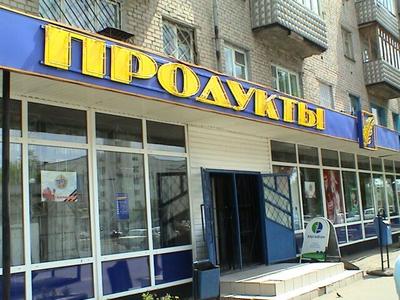
Natalia, the baby home representative, and a sales woman looking at wallpaper.
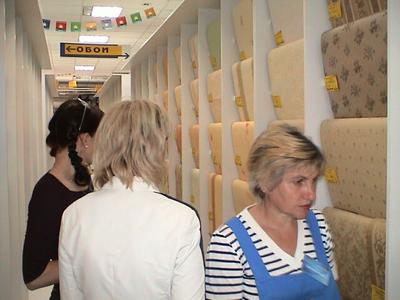
Loading the wallpaper in the trunk of Alexander's car.
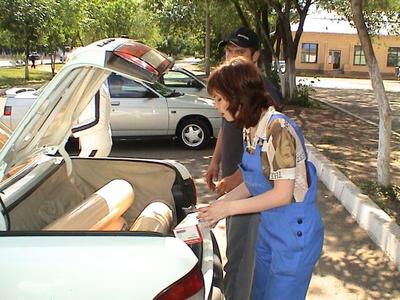
The baby home representative telling us her plans for the new wallpaper.
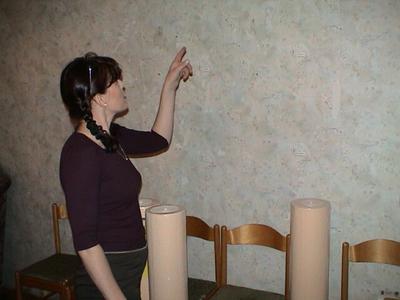
The baby home director's reaction to the new wallpaper.
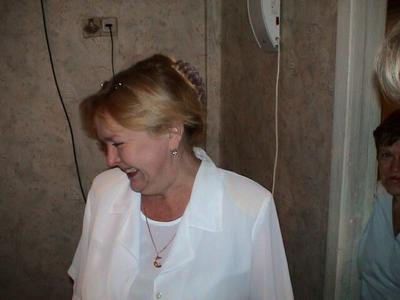
Before we head to court: DW meets for the last time with Candidate #3.
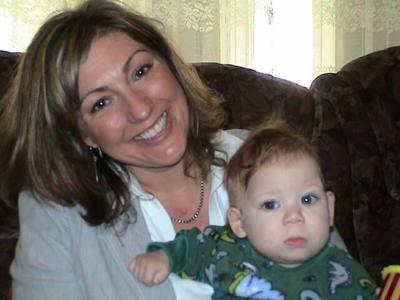
Nungesser's final meeting with Candidate #3. Stacking cups, one of his usual favourites, are much more fun.
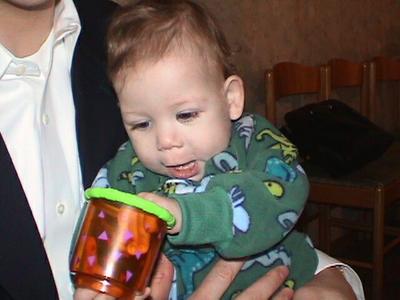
The main entrance to the Orenburg Regional Court.
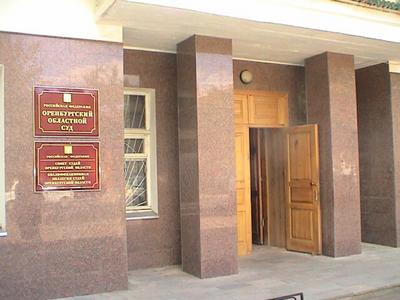
Vlad, Natalia, DW, and Olga before the main entrance to teh Orenburg Regional Courthouse.
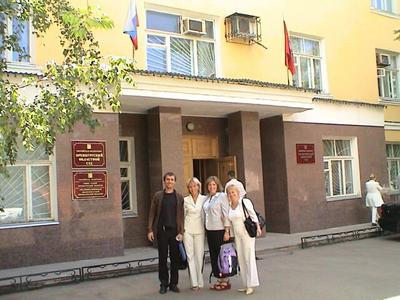
The entrance to Room #42 where our hearing was held.
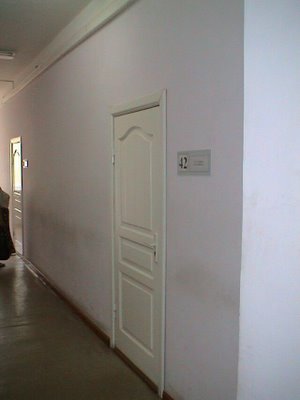
The bench in Room #42. The judge sat in the middle chair during our hearing.
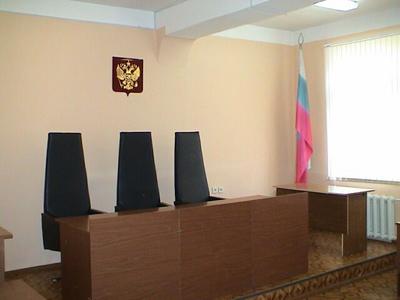
A view of the table (the one with the chair behind it) where the state's attorney sat during the hearing. No one used the podium in the foreground. The social worker sat oon the bench to the right of the state's attorney's table.
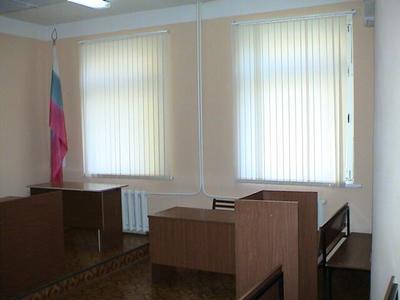
A view from the bench looking back towards the entrance door. Vlad smiling in the hallway as he departs.
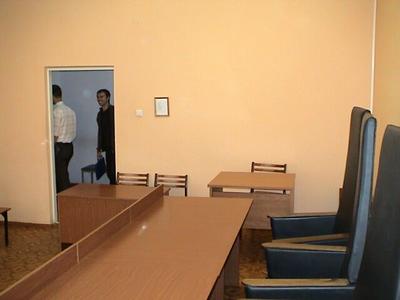
Vlad, Nungesser, and DW feeling much more relaxed outside the Orenburg Regional Courthouse after our hearing.
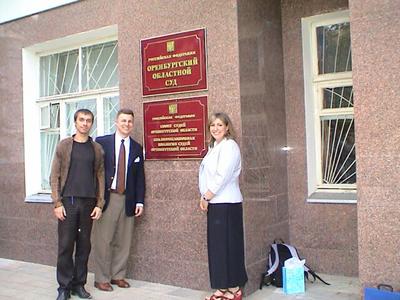

<< Home